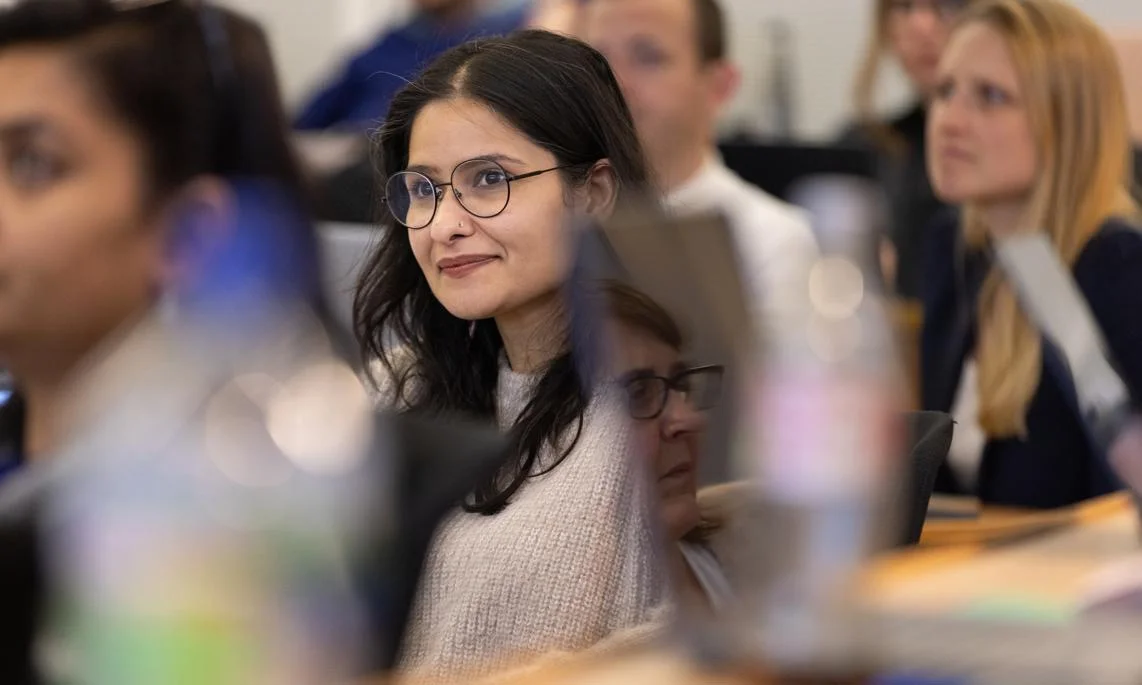Overview
Introduction
Designed for full-time professionals across diverse sectors, this programme enables you to gain a graduate qualification in behavioural science and pursue new opportunities within this emerging field.
Taught by world-leading behavioural science experts, the programme combines rigorous academic training with practical insights. You’ll gain a theoretical understanding of behavioural science whilst learning how to design and test behavioural interventions and influence behaviour change in the real world.
The curriculum covers a broad range of topics, including behavioural decision science, corporate behaviour, research methods, and behavioural science in the age of AI.
The programme is arranged into three two-week intensive teaching sessions at the LSE campus in London. Outside of these sessions you can continue to work and study flexibly around your career from anywhere in the world. Following the end of the teaching sessions, you’ll complete a dissertation and apply your learning to your chosen area of interest.
Equipped with this qualification, you’ll have the skills to develop in your current professional role or transition to a new career.
Our department was recently ranked first in the UK for psychology by the Good University Guide 2026, and first in London for psychology by the Complete University Guide 2026.
Preliminary readings
- P Dolan Happiness by Design (Penguin, 2014) and Happy Ever After (Penguin, 2019)
- D Kahneman Thinking Fast and Slow (Penguin, 2012)
- C R Sunstein and R Thaler Nudge (Penguin, 2009)
Entry requirements
Upper second class honours (2:1) degree or equivalent and three years’ relevant post-graduation work experience.
We do require students to be passionate about studying behavioural science and its applications. You can tell us about this passion in your statement of academic purpose.
Although we don't require students to have a quantitative background, research methods is a core component of the programme. This is essential in order for you to be able to conduct rigorous and credible research in behavioural Science. The training will start at a level that enables all students to participate. However, if you don't have previous exposure to quantitative methods you may find that you need to invest additional time developing you skills in this area throughout the programme.
Please select your country from the dropdown list below to find out the entry requirements that apply to you.
Overseas
English language requirements
The English language requirement for this programme is Higher. Read more about our English language requirements.
Competition for places at LSE is strong. So, even if you meet the minimum entry requirements, this doesn't guarantee you an offer of a place.
However, please don’t feel deterred from applying – we want to hear from all suitably qualified students. Think carefully about how you can put together the strongest possible application to help you stand out.
Programme content
This 16-month programme normally starts in September and is divided into six half-unit taught courses for the first eight months, followed by a dissertation unit for the remaining eight months. Teaching sessions usually take place in September, January and April.
Following the taught courses, you'll pursue an independent piece of research within the field of behavioural science. The dissertation can consist of an empirical analysis of existing data, a collection and analysis of new data, a randomised controlled experiment (lab, field or online) or a systematic review of the literature. You'll be supervised by a member of academic staff.
Learn more about previous dissertation topics
Teaching dates
The teaching dates for the 2026/27 academic year are as follows:
- 7-18 September 2026
- 4-15 January 2027
- 12-23 April 2027
Year 1
Year 2
Why study with us
Meet the department
The Department of Psychological and Behavioural Science is a growing community of researchers, academics and students who explore the human mind and behaviour in a societal context.
From our early beginnings as a group of researchers studying psychology and society 60 years ago, the department is now home to an interdisciplinary faculty team conducting wide-ranging research.
Today, our research spans:
- social psychology
- behavioural economics
- political psychology
- organisational culture
- consumer behaviour
- public engagement
- community development
- global health, happiness and well-being
- planetary health.
Our research is connected with what is happening in the world today. The outputs impact policy, business and society at large. This focus on real-world issues sets our department, and LSE, apart from other institutions and our students inform and inspire the direction of our work.
We offer various taught programmes and research opportunities, ranging from our BSc in Psychological and Behavioural Science to doctoral training – all with an emphasis on practical, policy-related issues.
By maintaining this focus on real-world issues and societal impact, our department leads the way with innovative research in the field, the lab and everywhere in between.
We were recently ranked first in London for psychology (Complete University Guide 2026) and first in the UK for psychology (Good University Guide 2026). So, you’ll be studying at a top-rated university.
Whether you want to study, research or teach, you’ll find in our departments a supportive and inspirational community where you can contribute to global debates and change.
Learn more about our programmes and research.
Department of Psychological and Behavioural Science
Who's who
Professor Paul Dolan

Dr Matteo M Galizzi







Dr Grace Lordan




Why LSE
University of the Year 2025 and 1st in the UK in 2025 and 2026
Times and The Sunday Times - Good University Guide 2025 and 20261st in London for the 14th year running
The Complete University Guide - University League Tables 20266th in the world for the study of social sciences and management
QS World University Rankings by Subject 20256th in the world for leading the way in social and environmental sustainability
QS World University Rankings: Sustainability 2026Your application
Overview
We welcome applications from all suitably qualified prospective students. At LSE, we want to recruit students with the best academic merit, potential and motivation, irrespective of background.
We carefully consider each application and take into account all the information included on your application form, such as your:
- academic achievement (including predicted and achieved grades)
- statement of academic purpose
- two academic references (normally one academic and one professional. However, applicants who graduated from their most recent study before January 2016 may provide two professional references)
- CV.
See further information on supporting documents
You may need to provide evidence of your English language proficiency. See our English language requirements
FAQs
Find the answers to some frequently asked questions
Contact us
If you have any queries or would like to find out more about the programme, please email us at pbs.emsc@lse.ac.uk.
Who attends
About our students
Our students come from a wide range of academic and professional backgrounds from all over the world, but one thing binds them together: a passion for behavioural science and a desire to better understand how principles from behavioural science can be applied in their professional (and personal) lives. The diversity of the class means that students are exposed to a wide range of perspectives, and that they leave LSE with a strong network of of peers from across the globe.
When to apply
Applications for this programme are considered on a rolling basis, meaning the programme will close once it becomes full.
There is no fixed deadline by which you need to apply, but we advise applying early in the admissions cycle in order to increase your chance of being successful.
Fees and funding
The table of fees shows the latest tuition fees for all programmes.
You're charged a fee for your programme. Your tuition fee covers registration and examination fees payable to the School, lectures, classes and individual supervision, lectures given at other colleges under intercollegiate arrangements and, under current arrangements, membership of the Students' Union. It doesn't cover fieldwork, travel or living costs in London.
Learning and assessment
How you learn
How you're assessed
Between sessions you will complete various assessments, such as essays and take-home exams. Students should expect to dedicate at least 10-15 hours per week on average on self-study when away from campus.
After the final teaching session, you'll work on your dissertation with support from your supervisor. The dissertation is an original piece of research that develops ideas and tools learned in the courses. It's on a topic you select, and falls within your professional or personal research interests. You'll have clear guidelines shared with other students, and are supervised by a faculty member. If you wish to pursue a PhD the dissertation may form the basis for your eventual doctoral thesis.
Graduate destinations
Overview
This EMSc will prepare you to seek and/or advance your career in behavioural science in multiple sectors, including international organisations, the private and public sectors, non-governmental organisations, and academia.
Learn more about our alumni and their careers
Further information on graduate destinations for this programme
Career support
From CV workshops through to careers fairs, LSE offers lots of information and support to help you make that all-important step from education into work.
Many of the UK’s top employers give careers presentations at the School during the year and there are numerous workshops covering topics such as job hunting, managing interviews, writing a cover letter and using LinkedIn.
See LSE Careers for further details.
